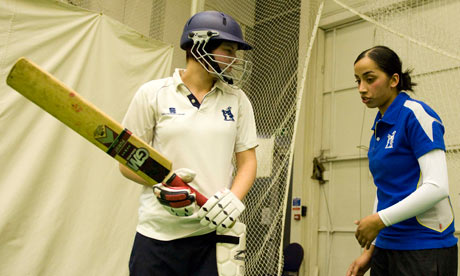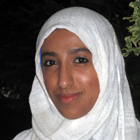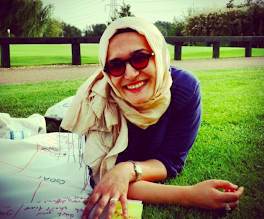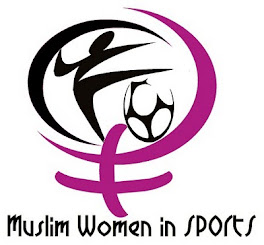
Salma Bi (right) … 'The main challenge is family support'. Photograph: Nick Wilkinsonk
On a recent weekday evening at London's Wembley Stadium, half a dozen Muslim women, some wearing headscarves, were taking it in turns to flip over some male opponents with impressive shoulder-height kicks.
These women, demonstrating Safari Kickboxing's female-only Muay Thai Kickboxing classes, were taking part in a ground-breaking celebration of Muslim women in sport. Pioneered by the Muslim Women's Sports Foundation (MWSF) and supported by the FA, the evening's Ambassador Awards showcased the diverse sporting talent of Muslim women across the UK and abroad.
"I cannot think of a better backdrop to these inaugural awards than Wembley," says the FA's chairman David Bernstein. "It is a stadium synonymous with achievement, excellence, inclusivity, variety and success … I've seen what Muslim women have achieved – it will be an inspiration for the wider community."
With awards ranging from UK Sportswoman of the Year to Volunteer of the Year, the MWSF is keen to recognise different forms of sporting success – both at professional and grassroots levels. The organisation strongly believes that faith and sport for both genders are entirely compatible and that the culture of sport is an essential part of Islamic history. Since its establishment in 2001 it has been at the forefront of encouraging physical activity amongst women from British ethnic-minority communities, particularly focusing on the cultural sensitivities of Muslim women.
So why aren't enough Muslim women getting involved in sports? The recurring theme seems to be cultural attitudes. Salma Bi, a 26-year-old cricketer, and the only female Muslim umpire at Level 1A, has founded her own coaching academy, and believes "the main challenge is the support of the family". It is much harder to excel in anything if your loved ones don't understand why it's important to you.
Moreover, concerns over maintaining modest dress and contact sports with members of the opposite sex can also make traditional sports clubs off-putting. Ayesha Abdeen, MWSF's Chief Executive says, "we found that Muslim women are the hardest to get active – if you can cater to their requirements, you can cater to anybody's".
Offering female only sports clubs or sessions has helped to combat this and provide opportunities where more Muslim women feel comfortable in enjoying sport. MWSF also allows mothers to bring their kids along to some training sessions.
Cultural barriers to participation were recently highlighted in Saudi Arabia, when the country refused to allow Saudi women to compete in the Olympics. The institutional barrier, by contrast, can be seen in Fifa's ban on women wearing hijab on the pitch. The Iranian women's football team could not complete their 2012 Olympic second-round qualifying match against Jordan because they refused to remove their headscarves.
The new awards will hopefully provide role models for other Muslim women. One such role model for many will be the MWSF's International Sportswoman of the Year, Ibtihaj Muhammad. She is an American sabre fencer and Olympic hopeful who has made the last two US World Championship teams is ranked second in the US and hopes to be the first Muslim woman representing the US in any sport whilst wearing hijab. Although she has said it is "extremely difficult being different in the sports world – be it for religion or race" issues of faith, race, gender and sport need not clash. "I would never fence if it compromised who I am and my religion – I love that the two work together."
Source: http://www.guardian.co.uk/lifeandstyle/the-womens-blog-with-jane-martinson/2012/may/10/muslim-women-excelling-at-top-level-sport
Source: http://www.guardian.co.uk/lifeandstyle/the-womens-blog-with-jane-martinson/2012/may/10/muslim-women-excelling-at-top-level-sport






